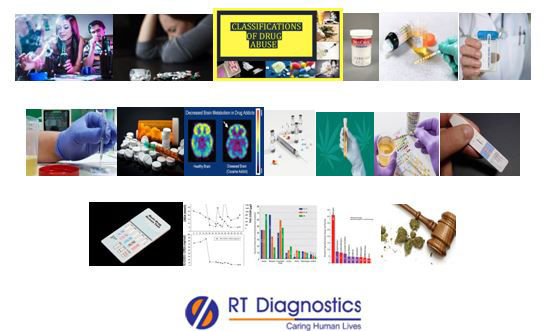Urine Cannabinoid Test:
Why Urine Cannabinoid Test?
CLINICAL INFORMATION
Herbal medications (chemical substances with active principles purified from plant extracts) obtained from plant sources have their impact on the human body and the mind. Moreover, a few other medications (exogenous chemicals) obtained from plants too have a seriously harmful impact on us.Many such synthetic chemicals that are also commercially available as products (such as forbidden recreation substances) are used as abusive drugs/drugs of abuse are thus banned. Some drugs tend to make a person (user) very active and energetic (as it provides a rush and is believed to increase productivity and performance) eg. Adderall, cocaine, meth, Ecstasy etc (such as nerve stimulants – Central Nervous System Stimulants, since they stimulate the brain cells), while another group of drugs makes others feel calm and relaxed eg. Alcohol, opiates, barbiturates etc (since they suppress or masks the functioning of the brain cells - Central Nervous System Depressants) eg. Hallucinogens like LSD, PCP, Psilocybin Mushroom etc (cause “tripping” – Since it alters user’s perception of reality as it often results in auditory and visual hallucinations). Hence these abusive drugs are also called either ‘uppers’ or even ‘downers’ respectively. But constant use of either CNS Stimulants or CNS Depressants, (in normal people without any underlying CNS pathologies without a physician’s prescription) beyond any doubt, certainly will have a harmful impact in the long run. Hence, therefore to avoid such situations, many countries in the world have established a legal classification for forbidden drugs banned by Government Agencies eg CDL – Central Drug Laboratories, CDSCO- Central Drugs Standard Control Organization, DEA- Drug Enforcement Administration, World Anti-Doping Agency (sports) etc. DREs classify abusive drugs in one of seven categories: CNS Depressants, CNS Stimulants, hallucinogens, dissociative anaesthetics, narcotic analgesics, inhalants and cannabis.MARIJUANA is also called ganja, weed, Mary Jane etc. it is a greenish-grey mixture of the dried flowers of Cannabis sativa. Some people smoke marijuana in hand-rolled cigarettes, dabbing, vaping etc.Marijuana produces over 100 cannabinoids. THC is one of the most potent psychoactive cannabinoids in marijuana among its other metabolites. Marijuana and its metabolites like Cannabinoids: THC – Tetrahydrocannabinol – It is the psychoactive ingredient that affects the brain cells for the desired effect that the user desire (It is obtained from Cannabis sativa or Cannibisindica) and Cannabinoids – Used to stimulate appetite, alleviate pain, reduce anxiety and control nausea and vomiting (any of a group of closely related compounds which include cannabinol and the active constituents of Cannabis such as THC, THCA, CBDA, CBD, CBN, CBG, CBC, THCV, CBDV etc).THC (delta 9 tetra hydro cannabinol) is a mind-altering (can change the mood or alters consciousness) psychoactive chemical in marijuana. It triggers food, sex, and pleasure centre in the brain and unleashes dopamine (which gives a euphoric and relaxed feeling). In the long run chronic abuse it can cause complications. It induces unpleasant emotions with feelings of being afraid, anxious, panic or paranoid etc, gradually leading to clinical depression. Marijuana - THC Tests are usually performed for drug abuse is performed in collected sample specimens such as blood or urine (urine specimen is more preferred). The ingested drug eventually breaks down as metabolites by the body and is expelled through urine. Urine sample specimens are preferred over blood because it is way more accurate and also because the drug leaves the blood a lot faster than in the urine. This test is performed to screen for and to monitor abuse of drugs (Marijuana - THC) and helps to detect and evaluate the presence of intoxication (eg overdose of drugs) and prognosis (monitor patient’s compliance with medicines etc). The test result indicates either positive, negative or “in-conclusive”/invalid. A positive result means that a high amount of metabolites (Marijuana - THC) were found in the suspects' urine for the drug indicated and the test result reveals the details of the drugs ingested along with the concentration of its metabolite in the urine sample specimen. This test is indicated in suspicion cases, medical screening, employment testing, military testing, athletic testing, legal and forensic testing, and legal investigations for the justice of a person undergoing post-traumatic stress in a road traffic accident (RTA)against criminals– eg during intoxicated driving (federal, state, local laws etc)and/or hit and run cases etc. Other sample specimens used (other than urine and blood) are saliva, scalp hair (i.ehair follicle), nails etc for drug testing. The initial screen reveals the presence of drugs and is further confirmed by other advanced analytical test methods such as Mass Spectroscopy. Additional tests include the Duquenois-Levine test (performed with Duquenois-Levinereagent), Thin Layer Chromatography (TLC) Test, Beam’s CBD Test, neurological testing (EEG test)etc.

General Instructions:
Sample Requirement: Specimen - Urine Sample. Test Preparation: None.
NOTE - Sample for specimen collections may vary based on the patient’s condition/cases according to the patient’s presenting complaints/signs or symptoms:
SPECIMEN REQUIREMENT (Special or Rare Cases) - As instructed and guided by Physician / Clinician / Pathologist / as per Laboratory’s requirements, according to procedures and protocols.
This Multi-Specialty Clinical Referral Laboratory RT DIAGNOSTICS provides precise and accurate tests with an extensive range of testing services to the medical centres to help in the diagnosis and identification of pathology in the test specimens for infectious diseases and also to evaluate the function of organ systems of the the the patient. It prevents further complications and helps to stabilize and restore health to near normalcy at the earliest without delay.



